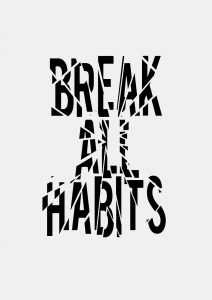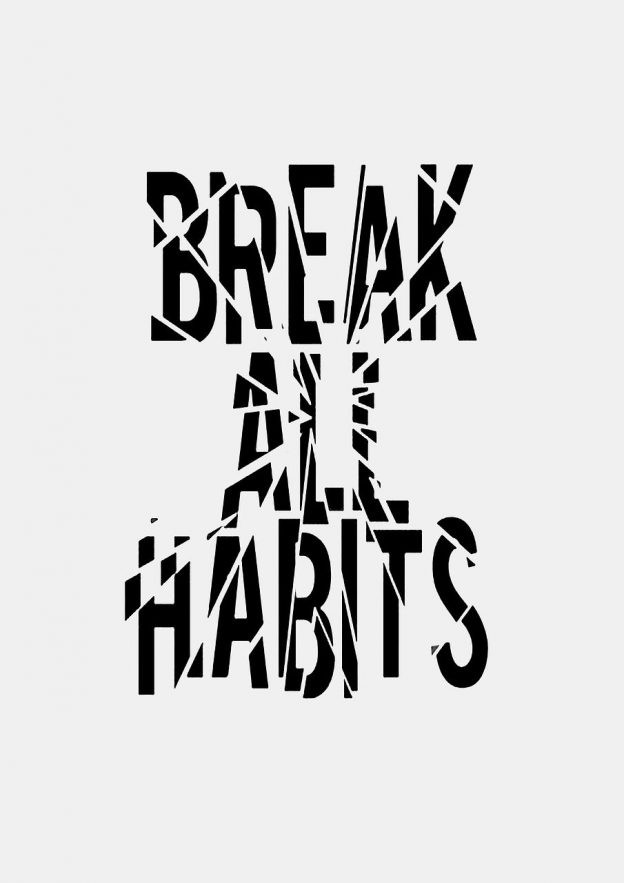Habits are things we do, almost on auto-pilot. Some of them are good – cleaning your teeth on a regular basis, eating healthily at least most of the time, that kind of thing. But others are definitely less good – smoking, drinking too much, the list goes on.
If you believe most self help books and sites, you’ll have been told that it takes 21 days to break a habit or form a new one.
That’s kind-of true but – as with most things in real life – your mileage may vary and you might kick a habit faster or slower – let’s take a deeper look.
Your mind – your decision
 The fastest I’ve known anyone change a bad habit was instantly – several ex-smokers I know just decided that from a certain date, that was it, no more cigarettes. Obviously they hadn’t read any of the many sites that say stopping smoking takes a long time. They’d just decided they’d had enough and were going to stop.
The fastest I’ve known anyone change a bad habit was instantly – several ex-smokers I know just decided that from a certain date, that was it, no more cigarettes. Obviously they hadn’t read any of the many sites that say stopping smoking takes a long time. They’d just decided they’d had enough and were going to stop.
It wasn’t willpower, it was just a conscious decision that enough was enough. One of them still smokes a cigar once a year, at Christmas, but the others haven’t smoked for years.
Which means that at least part of the process of changing a bad habit is wanting to make the change.
If you’ve ever tried to break a habit and not succeeded, you’ll know that somewhere, maybe deep down, you didn’t really want to make the change and it didn’t happen.
Do you really want to change?
This is related to the previous heading.
Ask yourself that question and go with your first answer – the one that pops into your head almost before you’ve asked the question – because that’s the real answer, the one your subconscious has delivered.
If the answer was no, you’ve got some things to do before you can actually change your habit and the process will take longer.
The smokers I mentioned earlier had their subconscious on-board with the decision (even if they likely wouldn’t know that).
Other people I know who know they should give up or at least reduce eating junk food have been saying that for as long as I can remember but are still tempted. And, yes, eating junk food is just as much a habit as the more obvious things like drinking or biting your nails or grinding your teeth.
If the answer wasn’t a resounding “yes” then you need to work out why. Maybe with the help of an understanding friend,
Decide you are going to change this time
For lots of people, this won’t be the first time they’ve tried to break this particular habit.
If that’s you, this exercise will help.
It’s a fairly standard workplace exercise but don’t worry about that – just go with the process.
Get a sheet of paper – like most things where we’re trying to change something that’s ingrained, real paper and a real pen or pencil is better than a keyboard.
Draw a line vertically down the middle of the paper.
Set aside all distractions and turn your phone to silent except for setting a timer for about 10 or 15 minutes.
Then – to the exclusion of anything else – write down the plus points of your habit in one column and the minus points in the other.
Don’t edit your thoughts, just let them bubble out of your head onto the paper.
Keep writing until the time up sounds.
If your mind goes blank, don’t worry, that happens.
Just write as many plus and minus points.
The answers should tell you whether this really is a big priority for you or whether you’re just doing it to keep the people around you happy.
The length of the lists might be a clue but it may not be. There might be a giant reason in the minus points of your habit that outweighs everything else (risk of death from too much fast food?) or it could be lots of small things that add up to a big reason.
You’ll know when you go down the lists you’ve written.
And that could well help bring your subconscious mind on-side and be the trigger that’s needed.
Set a start date and a target end date
The start date could be today or it might be Monday next week. Just don’t put it too far ahead in the future otherwise you’ll probably find an excuse not to start at all.
The target end date is a bit trickier.
As I said at the start, 21 days to change a bad habit is just a ball park figure.
Temptation can still creep in and that can disrupt the changes.
Personally, depending on the severity of the habit, I choose anything from a week to a month when I do this exercise on something I want to change in my life.
The importance of the start and end dates is that they give you a framework to finally change the habit for good.
Don’t beat yourself up if you miss the end date by a week but still break the habit.
But do congratulate yourself if you’ve set a realistic end date and beat it.
And don’t be afraid to enlist the help of your subconscious. This page has help for getting rid of lots of different habits (choose the “breaking bad habits” option if yours isn’t addressed specifically).
I wish you good luck getting rid of your bad habits fast!






